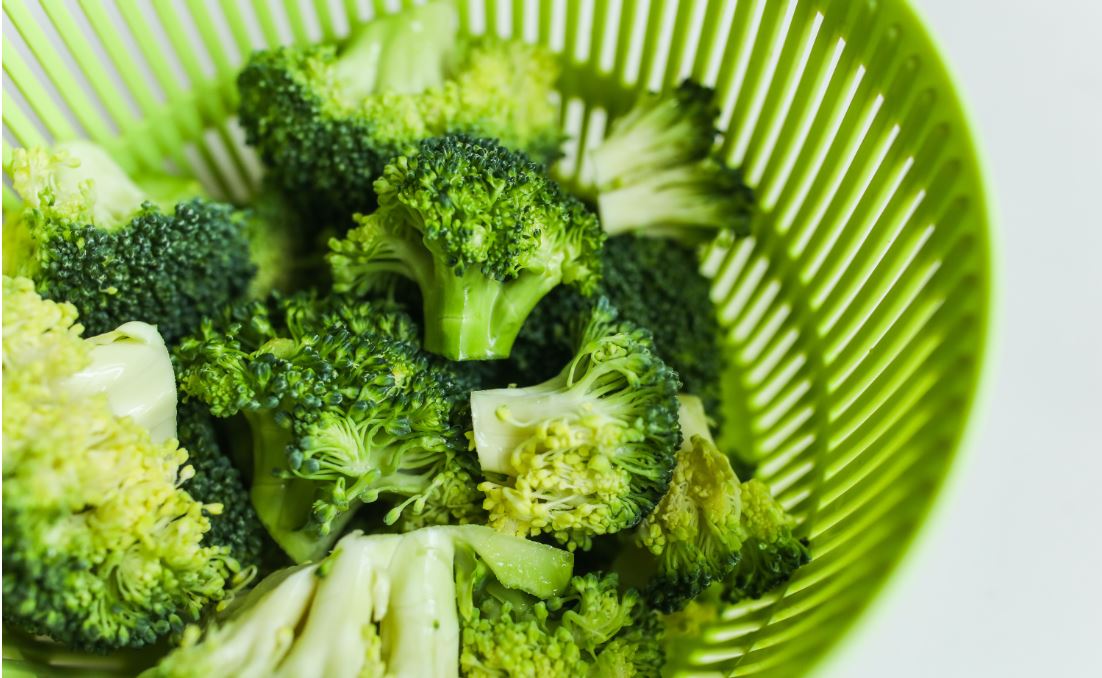Although many of us have heard the term ‘superfood’, which means a food is considered exceptionally good for one’s health and for boosting the immune system, people usually link the term to foods and spices grown in exotic countries such as Turmeric, Goji Berries and Quinoa. But how about the Broccoli, a little forgotten superfood, which is cultivated well on local soil here in the UK?
What is Broccoli?
Broccoli is an edible green plant from the cabbage family, which has a large flowering head and edible stalk. There are over 10 types of different Broccoli plants including Romanesco Broccoli, Broccolini and Calabrese Broccoli and these varieties can be consumed steamed, added to stir fries, boiled or they can be eaten raw.
Vitamins and Minerals in Broccoli
About 80 grams (two spears) of broccoli count as 1 of your 5 a day and it is great news that this superfood vegetable is also high in:
• Minerals such as Potassium and Calcium
• Vitamins such as Vitamin C, Vitamin K and Choline
In addition, broccoli has low levels of carbohydrates, protein and fat (1).
Benefits of Consuming Broccoli
There are many health benefits associated with the consumption of this vegetable including:
- Aiding detoxification – research shows that consuming half a cup of broccoli sprout juice per day helps excrete air pollutants (2).
- High blood pressure – murine study (3) revealed that rats fed 200 mg dried broccoli sprouts per day for 14 weeks had a reduced blood pressure.
- Skin benefits – research found that when extracts of 3-day-old broccoli sprouts are applied to skin it protects against UVA (sun) induced inflammation (4).
- Stomach/gut health – eating broccoli, equivalent to 3 and ½ cups per day is beneficial for gut bacteria, which has the ability to regulate the immune system (5).
- Bone health – the high Calcium and vitamin K content of broccoli may help with bone health – preventing osteoporosis and fractures (6).
- Anaemia – initial research (7) with individuals with sickle cell anaemia who were asked to consume 50 g of homogenised broccoli sprouts showed promising results against the disease (however, further research needed).
- Cardiovascular disease – steamed broccoli (for 15 mins and consuming with other steamed collard greens such as cabbage) may reduce the risk of cardiovascular disease (8).
- Cancer prevention – in vitro (lab) studies show that broccoli may help in the prevention of cancer through a chemical contained in the vegetable called sulforaphane (which also gives the bitter taste of broccoli), but more human studies needed to replicate results (9).
Cautions regarding Broccoli Consumption
- The fibre found in broccoli may cause gas or bowel irritation.
- Boiling (in boiling water for 15 minutes) best for antioxidant content (10).
- Individuals suffering from hypothyroidism (underactive thyroid) may consider lightly steaming or cooking broccoli instead of consuming raw (11).
Bibliography:
1. USDA. USDA Food Composition Databases. Usda. 2016.
2. Egner PA, Chen JG, Zarth AT, Ng DK, Wang JB, Kensler KH, et al. Rapid and sustainable detoxication of airborne pollutants by broccoli sprout beverage: Results of a randomized clinical trial in China. Cancer Prev Res. 2014;
3. Wu L, Noyan Ashraf MH, Facci M, Wang R, Paterson PG, Ferrie A, et al. Dietary approach to attenuate oxidative stress, hypertension, and inflammation in the cardiovascular system. Proc Natl Acad Sci. 2004;
4. Talalay P, Fahey JW, Healy ZR, Wehage SL, Benedict AL, Min C, et al. Sulforaphane mobilizes cellular defenses that protect skin against damage by UV radiation. Proc Natl Acad Sci U S A. 2007;
5. Hubbard TD, Murray IA, Nichols RG, Cassel K, Podolsky M, Kuzu G, et al. Dietary broccoli impacts microbial community structure and attenuates chemically induced colitis in mice in an Ah receptor dependent manner. J Funct Foods. 2017;
6. Kunstel K. Calcium requirements for the athlete. Curr Sports Med Rep. 2005;
7. Doss JF, Jonassaint JC, Garrett ME, Ashley-Koch AE, Telen MJ, Chi JT. Phase 1 study of a sulforaphane-containing broccoli sprout homogenate for sickle cell disease. PLoS One. 2016;
8. Kahlon TS, Chiu MCM, Chapman MH. Steam cooking significantly improves in vitro bile acid binding of collard greens, kale, mustard greens, broccoli, green bell pepper, and cabbage. Nutr Res. 2008;
9. Zhang Y, Tang L. Discovery and development of sulforaphane as a cancer chemopreventive phytochemical. Acta Pharmacologica Sinica. 2007.
10. Yuan G, Sun B, Yuan J, Wang Q. Effects of different cooking methods on health-promoting compounds of broccoli. J Zhejiang Univ Sci B. 2009;
11. Bajaj JK, Salwan P, Salwan S. Various possible toxicants involved in thyroid dysfunction: A review. Journal of Clinical and Diagnostic Research. 2016.

